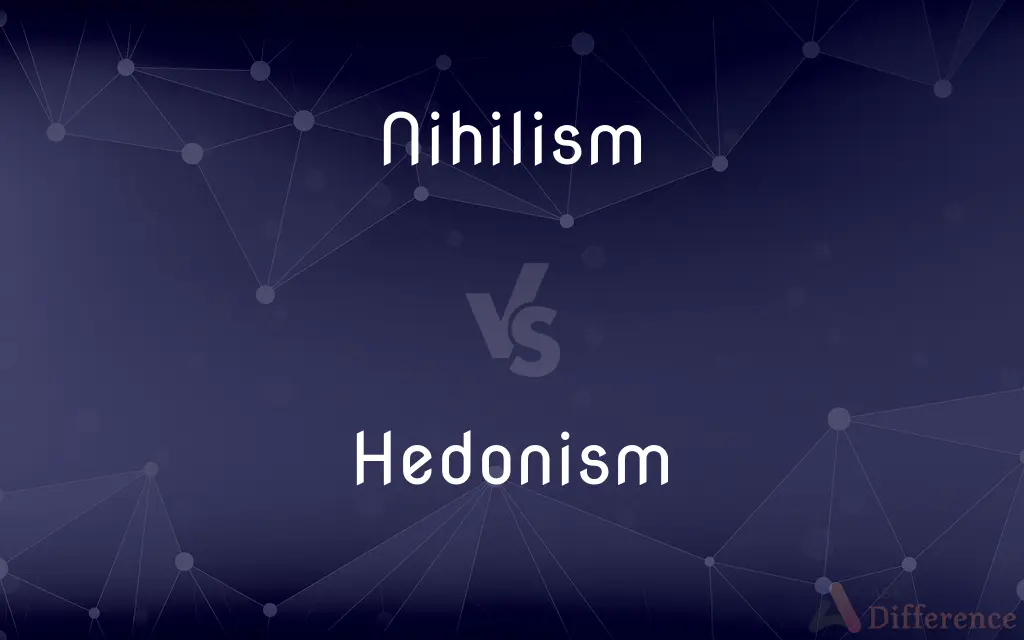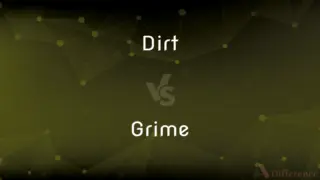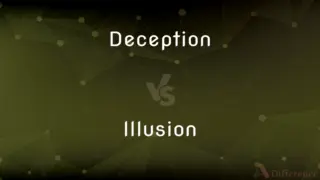Nihilism vs. Hedonism — What's the Difference?

Difference Between Nihilism and Hedonism
ADVERTISEMENT
Compare with Definitions
Nihilism
Nihilism (; from Latin nihil 'nothing') is a philosophy, or family of views within philosophy, expressing negation (i.e., denial of) towards general aspects of life that are widely accepted within humanity as objectively real, such as knowledge, existence, and the meaning of life. Different nihilist positions hold variously that human values are baseless, that life is meaningless, that knowledge is impossible, or that some set of entities do not exist, are meaningless, or pointless.The study of nihilism may regard it as merely a label that has been applied to various separate philosophies, or as a distinct historical concept arising out of nominalism, skepticism, and philosophical pessimism, as well as possibly out of Christianity itself.
Hedonism
Hedonism refers to a family of theories, all of which have in common that pleasure plays a central role in them. Psychological or motivational hedonism claims that our behavior is determined by desires to increase pleasure and to decrease pain.
Nihilism
(Philosophy) The doctrine that nothing actually exists or that existence or values are meaningless.
Hedonism
The pursuit of pleasure; sensual self-indulgence.
Nihilism
Relentless negativity or cynicism suggesting an absence of values or beliefs
Nihilism in postwar art.
ADVERTISEMENT
Hedonism
Pursuit of or devotion to pleasure, especially to the pleasures of the senses.
Nihilism
Political belief or action that advocates or commits violence or terrorism without discernible constructive goals.
Hedonism
(Philosophy) The ethical doctrine holding that only what is pleasant or has pleasant consequences is intrinsically good.
Nihilism
Also Nihilism A diffuse, revolutionary movement of mid-19th-century Russia that scorned authority and tradition and believed in reason, materialism, and radical change in society and government through terrorism and assassination.
Hedonism
(Psychology) The doctrine holding that behavior is motivated by the desire for pleasure and the avoidance of pain.
Nihilism
(Psychiatry) A delusion, experienced in some mental disorders, that the world or one's mind, body, or self does not exist.
Hedonism
The belief that pleasure or happiness is the highest good in life. Some hedonists, such as the Epicureans, have insisted that pleasure of the entire mind, not just pleasure of the senses, is the highest good.
Nihilism
The view that all endeavours are devoid of objective meaning.
Existential nihilism
Hedonism
(countable) A general devotion to the pursuit of pleasure.
Nihilism
The rejection of, or opposition to, religious beliefs, (inherent or objective) moral principles, legal rules, etc., often due to the view that life is meaningless (sense 1).
Moral nihilism
Hedonism
The doctrine of the Hedonic sect; the pursuit of pleasure as a matter of ethical principle.
Nihilism
The rejection of non-proven or non-rationalized assertions in the social and political spheres of society.
Hedonism
The ethical theory which finds the explanation and authority of duty in its tendency to give pleasure.
Nihilism
A delusion that oneself or the world, or parts thereof, have ceased to exist.
Hedonism
The pursuit of pleasure as a matter of ethical principle
Nihilism
Alternative case form of Nihilism
Hedonism
An ethical system that evaluates the pursuit of pleasure as the highest good
Nihilism
A doctrine grounded on the negation of one or more meaningful aspects of life; in particular, the view that nothing in the world actually exists.
Nihilism
(countable) Something that is regarded as meaningless.
Nihilism
Nothingness; nihility.
Nihilism
The doctrine that nothing can be known; scepticism as to all knowledge and all reality.
Nihilism
The theories and practices of the Nihilists.
Nihilism
A revolutionary doctrine that advocates destruction of the social system for its own sake
Nihilism
The delusion that things (or everything, including the self) do not exist; a sense that everything is unreal
Nihilism
Complete denial of all established authority and institutions
Share Your Discovery

Previous Comparison
Dirt vs. Grime
Next Comparison
Deception vs. Illusion














































